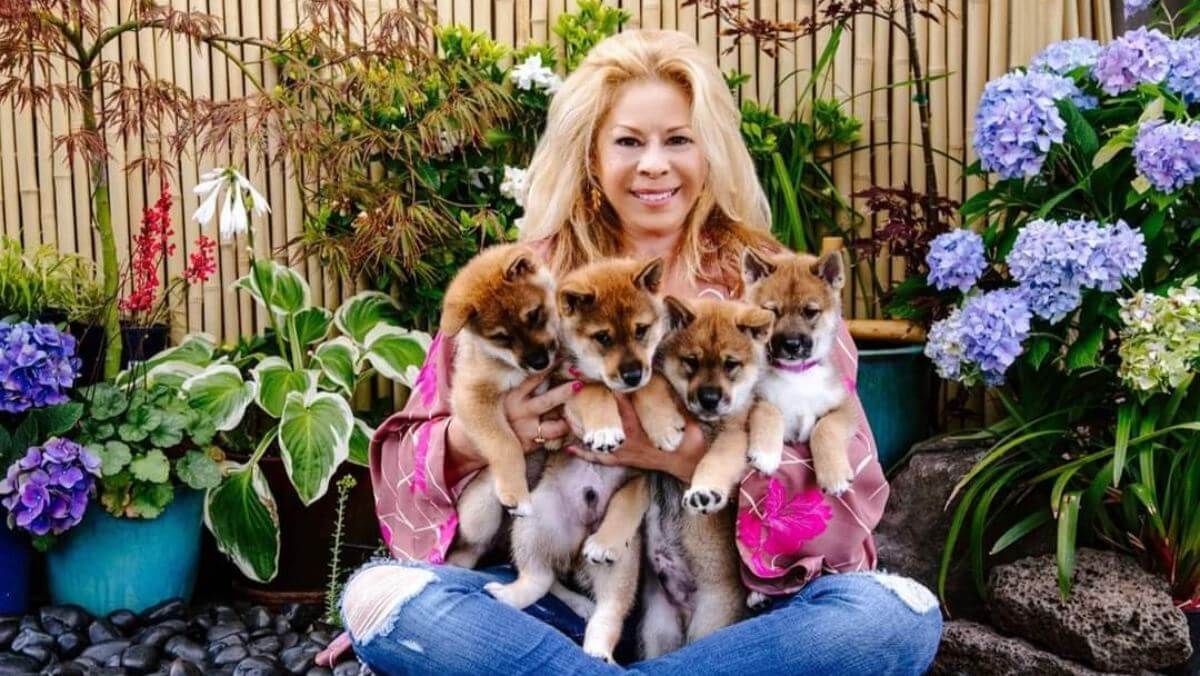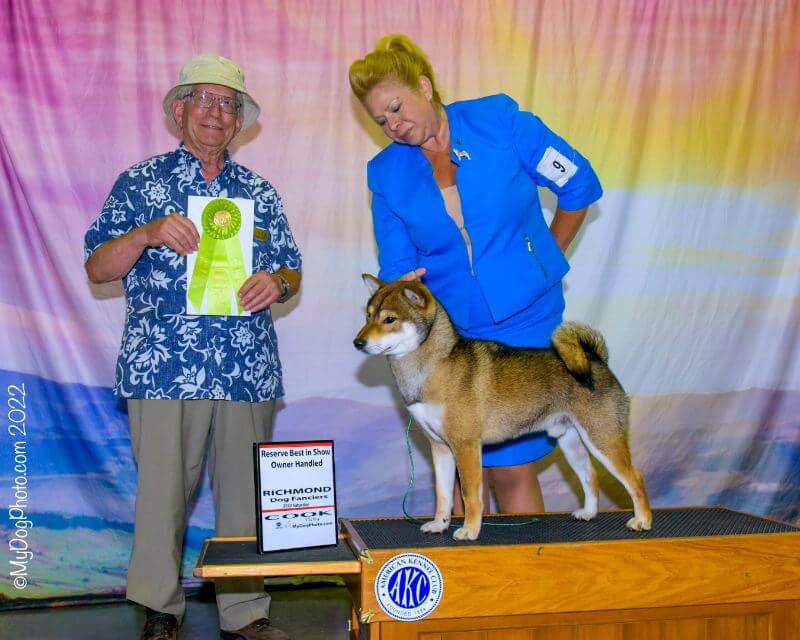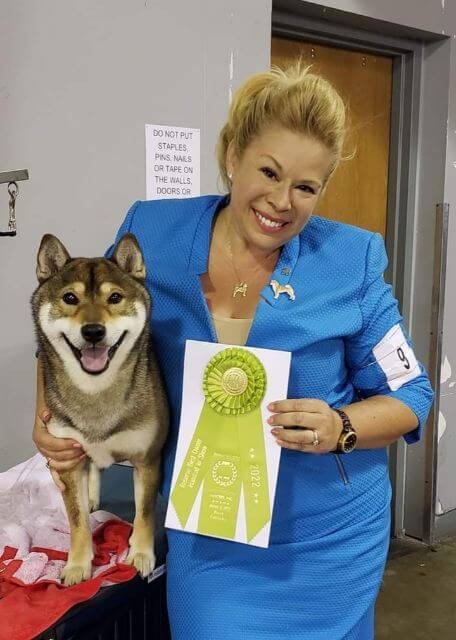
Home » Michelle Gori | The Breeder/Owner Handler

Michelle Gori: Twenty-three years ago, I took my two nephews to a park. Getting out of my car, a friendly little Shiba Inu ran across a parking lot (approaching with friendly body language) and happily jumped into my backseat, excitedly licking my nephews’ faces. I was pregnant and about to be a full-time mom, and I’d been researching dog breeds to get a puppy. I never knew about Shibas and I loved the size.
Michelle Gori: For 23 years I have owned Japanese breeds (Shiba/Shikoku), 11 years as an Owner Handler and only two years as a Preservation Breeder.
Michelle Gori: Yes, I attend regular weekly Conformation classes with Jacqueline Siotto and have done seminars as well.
Michelle Gori: Absolutely, especially during COVID! To train my first Shikoku for the ring, I did an online mentor program with Vicki Aquino Ranchette of Dog Show Prep School and am fortunate to be able to attend her workshops here in California. She is a wealth of knowledge and even did a Shikoku litter evaluation for me.
Michelle Gori: I do compete with my Shiba and have gotten a RBIS and multiple Group Firsts, but I have to divide my time in the Open Show ring with my Shikoku, and those wins don’t count in the rankings. I don’t really win enough to keep track of my dog’s numbers in the rankings, but that doesn’t mean I don’t dream of an invite to Westminster someday. There’s always another show!

Michelle Gori: I am only recently showing my first dog (Shikoku) out of the Bred-By classes. I feel that because I focused for so many years on education, being mentored, showing, and various titles, I didn’t produce my first litter until nine years later. So, after waiting so long to breed and keep a puppy, her wins are even more special. Specialties are very important to me. I’ve attended/entered five of our Nationals as far away as Florida and Missouri, three NIPPO Classics, and multiple Regionals. It’s important to network with other breeders, support the National Club, and show how vested and invested in the breed one is.
Michelle Gori: I think it is a challenge for a few reasons, but I’ll only mention this one: Shiba and Shikoku are very smart breeds and extremely intuitive. So, showing your “pet” in the ring means you are very tuned in to one another. Sometimes that can work against you.
Michelle Gori: Ever since I stepped foot in the show ring, there have been many breeders who have helped me, even though I did not get a dog from them—and they know who they are. As a Breeder-Mentor, I value the understanding and support in both breeds from my friend and mentor, Yumi Hagiwara. She also helped me import my first Shikoku from Japan. With over 40 years in the breed, and being Japanese, I’ve learned so much from her about these dogs, their tie to history, and their native land.
Michelle Gori: I feel the Breeder/Owner Handler is extremely important and sets us apart from the puppy mills and backyard breeders. It’s a reminder of the necessity that we, as reputable Preservation Breeders, are bringing our breeding stock in front of judges to be examined. The PMs and BYBs may also be allowed to list or register their poorly bred litters with AKC, but you can bet they aren’t bringing them in the ring. It’s very important to our breed (especially the Shiba), because they have become so insta-famous, and greedy PMs and BYBs have taken advantage of this. So, to be able to set ourselves apart, and get our well-bred Shibas out in public, is vital.
Michelle Gori: Take your time. It’s not just sticking two intact dogs together. I’ve seen new exhibitors in the ring one week, then two weeks later they’re posting a litter of puppies on social media. In that moment they lose all credibility in the breed community. It took me years to even decide if I wanted to cross over from exhibitor to preservation breeder. I didn’t take it lightly. I knew so many things could go wrong. I took courses on breeding, whelping, and emergency puppy care, and I assisted in deliveries with my mentors. When I was ready to have my first litter, I had many long-time breeders (in addition to my mentors) supporting me and just a phone call away if I needed help.
Michelle Gori: My goals are to breed and show lovely examples of my breeds, continue to learn, to show what lovely temperaments Japanese dogs can have (three of mine are Certified Therapy Dogs), and to encourage and inspire future Breeder/Owner Handlers to get involved in our breeds. I have been grateful that my dogs have won some very nice placements over the years (and even broke some records with my Shikoku), but I attend each show with an open mind and think anything can happen. I try not to get in my head so much. To me, a win can be making that connection or flipping that switch with my dog where I learned what I needed to do to become a better teammate in the ring.

Michelle Gori: It wasn’t funny at the time, but I look back now and not only laugh, I am touched by it. I have a son with autism and he doesn’t attend many shows with me. He was sitting ringside with his cell phone, and just as I stepped into the ring with my Veteran, he (all 5’-10” and 19 years old of him) came rushing into the ring after me. Well, of course, the ring steward was telling him, “Sir, you cannot come into the ring.” The judge was confused. As I rushed him (and my dog) out of the ring to calm him down and give him my phone (because his battery had run out on his phone), I could hear my fellow exhibitors explain to the judge that he had autism. The ring steward allowed me back in the ring with my dog and she was awarded a nice Select placement over specials. As I stood in the line-up, the professional handler was teary-eyed, showing many of us a softer side that no one knew she had. It showed me how supportive my fellow breed exhibitors were and an understanding that they had of my life. That win photo (which I brought my son into) hangs on my wall to this day. It reminds me: “We come for the dogs, but stay for the people.” —Vicki Cook